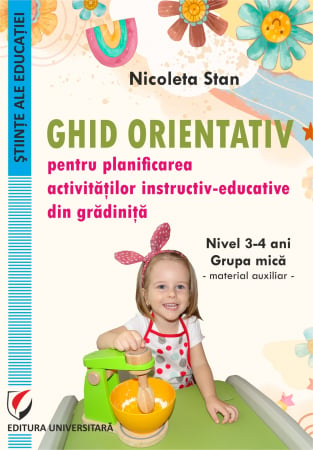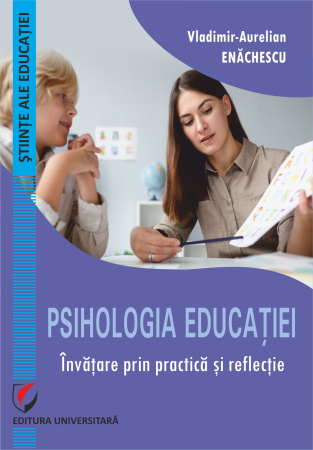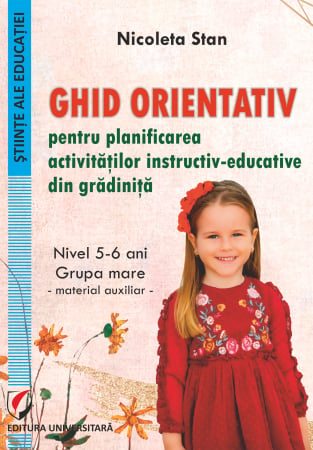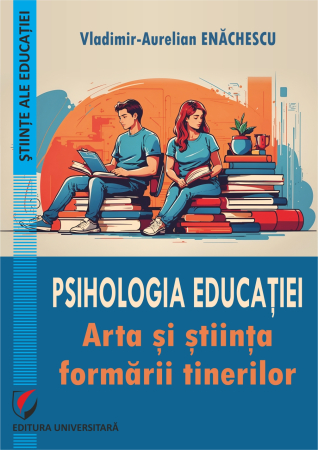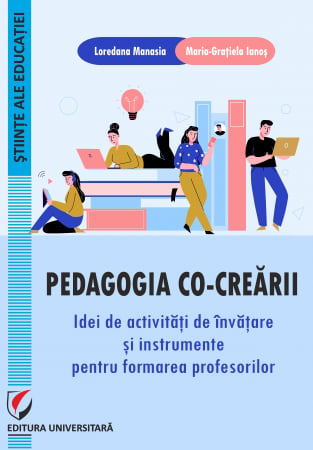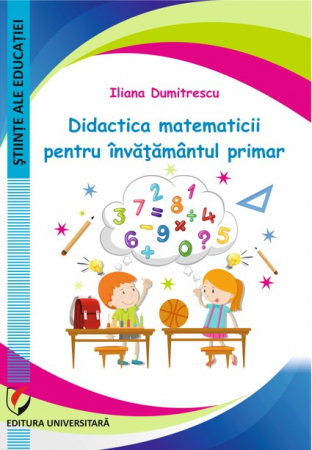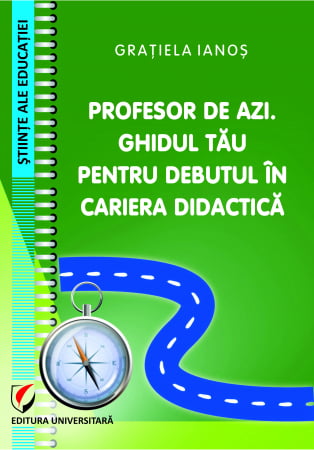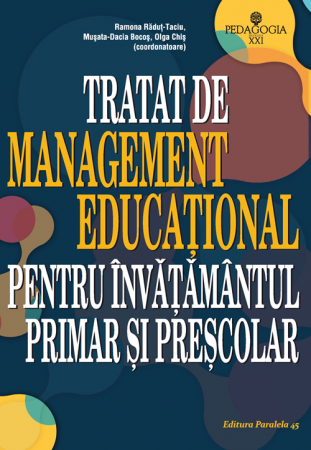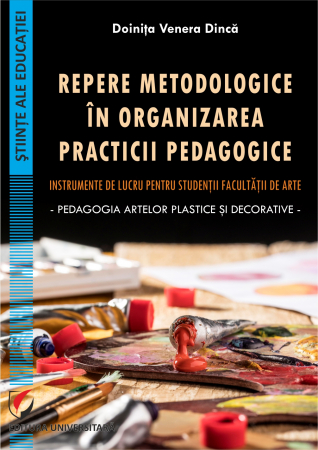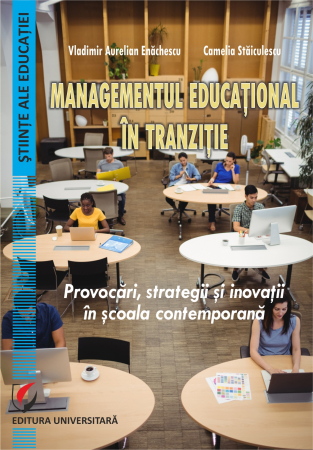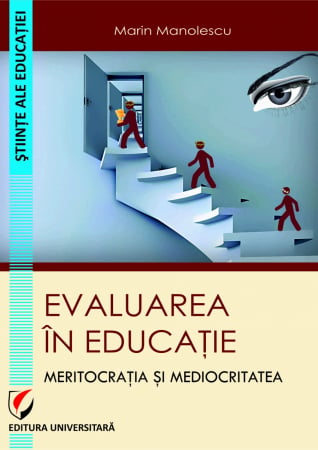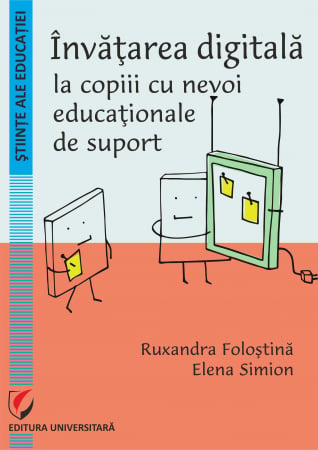Manuscript proposals: [email protected] / 0745 204 115 //// Tracking orders Individuals / Sales: 0745 200 357 / Orders Legal entities: 0721 722 783
6359.png) Drama therapy. The alternative-integrative method of recovering students with special educational needs
Drama therapy. The alternative-integrative method of recovering students with special educational needs
6359.png)
Publisher: Editura Universitară
Author: Daniela Agafiţei
ISBN: 978-606-28-1281-2
DOI: https://doi.org/10.5682/9786062812812
Publisher year: 2021
Edition: I
Pages: 120
Product Code:
9786062812812
Do you need help?
0745 200 357
- Description
- Download (1)
- Authors
- Content
- More details
- Reviews (0)
Building a society depends on the training of the people who constitute it, on the knowledge it acquires, on the level of culture they have, on the way they knew how to educate and shape themselves. sensitivity. In this process, school training has a fundamental function, hence the interest of any society to organize a more effective education system. In the formation of the modern man, the school represents a decisive step, the basic institutional framework of his training.
The status of the central objective of the school must be related to its formative power, to its great capacities to influence, in short, through its special social role.
The research is dedicated to the analysis of the formation of values and educational intelligences in students with disabilities through the method of puppet theater, skills and habits of correct, clear, nuanced, written and oral expression. Consequently, everything that is done in the classroom must be subordinated to this purpose.
The research aims to use the puppet theater method to finalize the integrative educational process, following the essence of the show as an intrinsic element of self-perception and self-knowledge.
The paper includes theoretical aspects regarding the processuality of the puppet theater method, the fundamentals of the method and the subordinate elements of the applied theory.
It will analyze the theme of the creative process, the puppet, the doll, the target group, the formation of autonomy on stage, the transformations suffered within the group.
It will conclude with the sharing of the experience, which will bring together all the elements of the alternative integrative process of the proposed method, having as finality the show.
The work is part of the trend of pedagogical change, of improving the educational practice, approaching the alternative-integrative method of puppet theater.
The object of the research was to follow the process of formation and recovery of cognitive and aesthetic intelligence in students with disabilities, by marking the relative level of school progress, achievement and non-achievement, school success or failure, using a parallel notation between intelligence level and results. obtained during the school years.
The purpose of the investigation was to establish pedagogical landmarks for the formation and recovery of cognitive and aesthetic intelligence in students with disabilities.
The research hypothesis was not only of a technical pedagogical nature, but also of an educational, experimental or positive nature in terms of working methods and practice, because it follows a pre-defined finality, namely determining the level of intelligence before and after applying the theater method. dolls. The formation and recovery of cognitive and aesthetic intelligence in students with disabilities will correspond to the educational approach, if it will be based on all special pedagogical and psycho-pedagogical principles, on the educational values of puppet theater, on the system of formal and non-formal educational activities and on marking the level. relative to school progress, achievement or non-achievement, school success or failure.
The status of the central objective of the school must be related to its formative power, to its great capacities to influence, in short, through its special social role.
The research is dedicated to the analysis of the formation of values and educational intelligences in students with disabilities through the method of puppet theater, skills and habits of correct, clear, nuanced, written and oral expression. Consequently, everything that is done in the classroom must be subordinated to this purpose.
The research aims to use the puppet theater method to finalize the integrative educational process, following the essence of the show as an intrinsic element of self-perception and self-knowledge.
The paper includes theoretical aspects regarding the processuality of the puppet theater method, the fundamentals of the method and the subordinate elements of the applied theory.
It will analyze the theme of the creative process, the puppet, the doll, the target group, the formation of autonomy on stage, the transformations suffered within the group.
It will conclude with the sharing of the experience, which will bring together all the elements of the alternative integrative process of the proposed method, having as finality the show.
The work is part of the trend of pedagogical change, of improving the educational practice, approaching the alternative-integrative method of puppet theater.
The object of the research was to follow the process of formation and recovery of cognitive and aesthetic intelligence in students with disabilities, by marking the relative level of school progress, achievement and non-achievement, school success or failure, using a parallel notation between intelligence level and results. obtained during the school years.
The purpose of the investigation was to establish pedagogical landmarks for the formation and recovery of cognitive and aesthetic intelligence in students with disabilities.
The research hypothesis was not only of a technical pedagogical nature, but also of an educational, experimental or positive nature in terms of working methods and practice, because it follows a pre-defined finality, namely determining the level of intelligence before and after applying the theater method. dolls. The formation and recovery of cognitive and aesthetic intelligence in students with disabilities will correspond to the educational approach, if it will be based on all special pedagogical and psycho-pedagogical principles, on the educational values of puppet theater, on the system of formal and non-formal educational activities and on marking the level. relative to school progress, achievement or non-achievement, school success or failure.
-
Drama therapy. The alternative-integrative method of recovering students with special educational needs
Download
DANIELA AGAFITEI
Argument / 11
Chapter I - From text to show / 15
1.1. Drama therapy - methodological concepts and psychoeducational effects / 15
1.2. Dramatization of the literary text / 17
1.3. Approaching the literary text from the perspective of cognitive and aesthetic recovery / 19
1.4. The need for a child 's story / 22
1.5. Conclusions: / 26
Chapter II - The puppet theater method the premise of the formation of educational intelligences and self-knowledge in children with disabilities / 27
2.1. Puppet theater - structure and importance / 27
2.2. Puppet theater and disability: approaches from an integrative perspective / 28
2.3. Imagination, corporality, spatial and temporal orientation / 30
2.3.1. Imagination / 30
2.3.2. Corporality / 31
2.3.3. Spatial and temporal orientation / 32
2.3.4. Language and time / 33
2.3.5. Working tools / 34
2.3.6. Conclusions / 34
Chapter III - Methodology of cognitive and aesthetic recovery of students with disabilities / 35
3.1. Target group - methodological principles / 35
3.2. Materials and methods / 39
3.3. The group of tested subjects / 41
3.4. Materials needed for the experiment / 41
3.5. Correction of tests / 42
3.6. How to interpret the results before and after the application of the puppet theater method / 42
3.7. How to interpret the results before and after the application of the puppet theater method / 46
3.7.1. Interpretation of the research with the help of graphics after the application of the puppet theater method / 51
3.8. Conclusions / 61
Chapter IV - Methodology of making puppets / dolls - preparation of the puppet show / 65
4.1. Puppet - construction, types of puppets / 65
4.2. Puppet construction / 65
4.3. Types of puppets / 66
4.3.1. Marionette / 66
4.3.2. Animal puppet / 70
4.4. Construction of dolls - protected workshop / 70
4.5. Original screenplays for puppet theater - comics / 86
4.5.1. Written text The Story of the Wheat Bean / 86
4.6. Conclusions / 95
Annexes / 102
Differentiation of classes by objects - TEST / 95
Division of flat figures - TEST / 96
Determining the number of TEST / 97 cubes
Transcript of figure TEST / 98
Observation of the gaps TEST / 99, 100, 101
Pacala, Tandala, Fata Babei, Fata Mosneagului - sketches / 102
Mosneagul, Baba, Ileana Cosanzeana, Fat Frumos / 103
Mos 2, Vasilache, Marioara, Zana Florilor / 104
Types of heads, types of mouths / 105
Sketches arms, palms, foot / 106
Puppet body sketch / 107
Puppet sketches / 108
Bird doll / sun doll-sketches / 109
Types of eyes / 110
Types of mouths / 111
Adapted text * Childhood memories * / 112 -117
Bibliography / 118
Chapter I - From text to show / 15
1.1. Drama therapy - methodological concepts and psychoeducational effects / 15
1.2. Dramatization of the literary text / 17
1.3. Approaching the literary text from the perspective of cognitive and aesthetic recovery / 19
1.4. The need for a child 's story / 22
1.5. Conclusions: / 26
Chapter II - The puppet theater method the premise of the formation of educational intelligences and self-knowledge in children with disabilities / 27
2.1. Puppet theater - structure and importance / 27
2.2. Puppet theater and disability: approaches from an integrative perspective / 28
2.3. Imagination, corporality, spatial and temporal orientation / 30
2.3.1. Imagination / 30
2.3.2. Corporality / 31
2.3.3. Spatial and temporal orientation / 32
2.3.4. Language and time / 33
2.3.5. Working tools / 34
2.3.6. Conclusions / 34
Chapter III - Methodology of cognitive and aesthetic recovery of students with disabilities / 35
3.1. Target group - methodological principles / 35
3.2. Materials and methods / 39
3.3. The group of tested subjects / 41
3.4. Materials needed for the experiment / 41
3.5. Correction of tests / 42
3.6. How to interpret the results before and after the application of the puppet theater method / 42
3.7. How to interpret the results before and after the application of the puppet theater method / 46
3.7.1. Interpretation of the research with the help of graphics after the application of the puppet theater method / 51
3.8. Conclusions / 61
Chapter IV - Methodology of making puppets / dolls - preparation of the puppet show / 65
4.1. Puppet - construction, types of puppets / 65
4.2. Puppet construction / 65
4.3. Types of puppets / 66
4.3.1. Marionette / 66
4.3.2. Animal puppet / 70
4.4. Construction of dolls - protected workshop / 70
4.5. Original screenplays for puppet theater - comics / 86
4.5.1. Written text The Story of the Wheat Bean / 86
4.6. Conclusions / 95
Annexes / 102
Differentiation of classes by objects - TEST / 95
Division of flat figures - TEST / 96
Determining the number of TEST / 97 cubes
Transcript of figure TEST / 98
Observation of the gaps TEST / 99, 100, 101
Pacala, Tandala, Fata Babei, Fata Mosneagului - sketches / 102
Mosneagul, Baba, Ileana Cosanzeana, Fat Frumos / 103
Mos 2, Vasilache, Marioara, Zana Florilor / 104
Types of heads, types of mouths / 105
Sketches arms, palms, foot / 106
Puppet body sketch / 107
Puppet sketches / 108
Bird doll / sun doll-sketches / 109
Types of eyes / 110
Types of mouths / 111
Adapted text * Childhood memories * / 112 -117
Bibliography / 118
Building a society depends on the training of the people who constitute it, on the knowledge it acquires, on the level of culture they have, on the way in which they knew how to educate and shape their sensitivity. In this process, school training has a fundamental function, hence the interest of any society to organize a more effective education system. In the formation of the modern man, the school represents a decisive step, the basic institutional framework of his training.
The status of the central objective of the school must be related to its formative power, to its great capacities to influence, in short, through its special social role.
The research is dedicated to the analysis of the formation of values and educational intelligences in students with disabilities through the method of puppet theater, skills and habits of correct, clear, nuanced, written and oral expression. Consequently, everything that is done in the classroom must be subordinated to this purpose.
The research aims to use the puppet theater method to finalize the integrative educational process, following the essence of the show as an intrinsic element of self-perception and self-knowledge.
The paper includes theoretical aspects regarding the processuality of the puppet theater method, the fundamentals of the method and the subordinate elements of the applied theory.
It will analyze the theme of the creative process, the puppet, the doll, the target group, the formation of autonomy on stage, the transformations suffered within the group.
It will conclude with the sharing of the experience, which will bring together all the elements of the alternative integrative process of the proposed method, having as finality the show.
The work is part of the trend of pedagogical change, of improving the educational practice, approaching the alternative-integrative method of puppet theater.
The object of the research was to follow the process of formation and recovery of cognitive and aesthetic intelligence in students with disabilities, by marking the relative level of school progress, achievement and non-achievement, school success or failure, using a parallel notation between intelligence level and results. obtained during the school years.
The purpose of the investigation was to establish pedagogical landmarks for the formation and recovery of cognitive and aesthetic intelligence in students with disabilities.
The research hypothesis was not only of a technical pedagogical nature, but also of an educational, experimental or positive nature in terms of working methods and practice, because it follows a pre-defined finality, namely determining the level of intelligence before and after applying the theater method. dolls. The formation and recovery of cognitive and aesthetic intelligence in students with disabilities will correspond to the educational approach, if it will be based on all special pedagogical and psycho-pedagogical principles, on the educational values of puppet theater, on the system of formal and non-formal educational activities and on marking the level. relative to school progress, achievement or non-achievement, school success or failure.
The research objectives involve analyzing the problem of cognitive and aesthetic intelligence in students with disabilities in the literature, identifying the system of cognitive and aesthetic intelligence to recover students with disabilities, developing the pedagogical model of training educational intelligence in students with learning difficulties and experimental validation of the pedagogical model for the formation of educational values and intelligences in students with learning difficulties.
The methods applied in the research were: documentation through the research of the specialized literature, observation, individual and frontal conversations, questionnaires, pedagogical experiment and last but not least the artistic show.
Theoretical innovation and scientific value of research results from the application of cognitive and aesthetic intelligence theory as a mediator of education of children with disabilities, based on puppet theater, seen as a non-formal, alternative integrative method, by developing and arguing landmarks and conditions for cognitive and aesthetic intelligence , by determining the cognitive-aesthetic intelligences and their role in the integrative educational orientation, as well as from the elaboration of the pedagogical model for the formation of the orientations of the cognitive-aesthetic intelligences in the students with SEN.
The practical value of the investigation
The results obtained through research will increase the interest and concerns for an efficient capitalization of the potential of using this method, starting from self-knowledge and continuing with the capitalization of the experience obtained later, having as finality the recovery and integration in society.
The theoretical considerations and conclusions obtained by researching the problem can be used as a starting point in further research. In terms of educational practice, the process of capitalizing on the puppet theater method can be continued throughout the training of the student with SEN.
The theses submitted for defense are the following: the theory of cognitive-aesthetic intelligences, the basis of the CES students' education methodology, which determines the awareness of the finality of the training process, as a subsequent element of integration; the ways of transmitting to the CES students the cognitive-aesthetic intelligences; puppet theater and theorizing the recuperative valences of the proposed method; deepening and capitalizing on the essential theme of creation: the disabled person as a doll, the autonomy acquired on stage, time, the metamorphosis of the group; the group - as a factor of transmitting the creative process and the show, by putting into practice the recovery process of the CES student, aiming at integrating the child in material and social reality, but also raising their awareness and introducing them in an accessible form in the world of intelligence cognitive aesthetics, through creation and play.
The application of the pedagogical model for the formation of the cognitive-aesthetic intelligences of the CES students, through the method of puppet theater, responds to the need to anchor the educational approach approached in the instructive-educational activity.
Research stages:
Stage I: exploring the theoretical conceptual framework of research
Stage II: the ascertaining and ameliorating experiment
Stage III: elaboration of the theoretical model and its experimental validation
Thesis structure:
The thesis includes preliminaries, four chapters, conclusions, bibliographic sources, annexes.
Chapter I deals with the methodological concepts and psycho-educational effects of drama therapy, the child's need for storytelling, as well as the approach of the literary text from the perspective of cognitive-aesthetic recovery of the student with special educational needs.
Chapter II develops the idea that the puppet theater method is seen as a premise for the formation of cognitive-aesthetic intelligence and self-knowledge in children with disabilities. of corporality, language and time, as well as the working tools used.
Chapter III analyzes the methodology of cognitive and aesthetic recovery of students with disabilities, establishing the target group, materials and methods, batch of tested subjects, materials needed for the experiment, proofreading, how to interpret the results before and after applying the puppet theater method. , interpretation of results using the graph method.
In the last chapter we offered specific indications regarding the doll, the types of dolls, its structure, the construction method for different shows, relevant images with the stages of building the doll, as well as the original scenarios.
The appendices contain the tests applied to the subjects, the work sketches, as well as the drawings that illustrate different characters from folklore.
The status of the central objective of the school must be related to its formative power, to its great capacities to influence, in short, through its special social role.
The research is dedicated to the analysis of the formation of values and educational intelligences in students with disabilities through the method of puppet theater, skills and habits of correct, clear, nuanced, written and oral expression. Consequently, everything that is done in the classroom must be subordinated to this purpose.
The research aims to use the puppet theater method to finalize the integrative educational process, following the essence of the show as an intrinsic element of self-perception and self-knowledge.
The paper includes theoretical aspects regarding the processuality of the puppet theater method, the fundamentals of the method and the subordinate elements of the applied theory.
It will analyze the theme of the creative process, the puppet, the doll, the target group, the formation of autonomy on stage, the transformations suffered within the group.
It will conclude with the sharing of the experience, which will bring together all the elements of the alternative integrative process of the proposed method, having as finality the show.
The work is part of the trend of pedagogical change, of improving the educational practice, approaching the alternative-integrative method of puppet theater.
The object of the research was to follow the process of formation and recovery of cognitive and aesthetic intelligence in students with disabilities, by marking the relative level of school progress, achievement and non-achievement, school success or failure, using a parallel notation between intelligence level and results. obtained during the school years.
The purpose of the investigation was to establish pedagogical landmarks for the formation and recovery of cognitive and aesthetic intelligence in students with disabilities.
The research hypothesis was not only of a technical pedagogical nature, but also of an educational, experimental or positive nature in terms of working methods and practice, because it follows a pre-defined finality, namely determining the level of intelligence before and after applying the theater method. dolls. The formation and recovery of cognitive and aesthetic intelligence in students with disabilities will correspond to the educational approach, if it will be based on all special pedagogical and psycho-pedagogical principles, on the educational values of puppet theater, on the system of formal and non-formal educational activities and on marking the level. relative to school progress, achievement or non-achievement, school success or failure.
The research objectives involve analyzing the problem of cognitive and aesthetic intelligence in students with disabilities in the literature, identifying the system of cognitive and aesthetic intelligence to recover students with disabilities, developing the pedagogical model of training educational intelligence in students with learning difficulties and experimental validation of the pedagogical model for the formation of educational values and intelligences in students with learning difficulties.
The methods applied in the research were: documentation through the research of the specialized literature, observation, individual and frontal conversations, questionnaires, pedagogical experiment and last but not least the artistic show.
Theoretical innovation and scientific value of research results from the application of cognitive and aesthetic intelligence theory as a mediator of education of children with disabilities, based on puppet theater, seen as a non-formal, alternative integrative method, by developing and arguing landmarks and conditions for cognitive and aesthetic intelligence , by determining the cognitive-aesthetic intelligences and their role in the integrative educational orientation, as well as from the elaboration of the pedagogical model for the formation of the orientations of the cognitive-aesthetic intelligences in the students with SEN.
The practical value of the investigation
The results obtained through research will increase the interest and concerns for an efficient capitalization of the potential of using this method, starting from self-knowledge and continuing with the capitalization of the experience obtained later, having as finality the recovery and integration in society.
The theoretical considerations and conclusions obtained by researching the problem can be used as a starting point in further research. In terms of educational practice, the process of capitalizing on the puppet theater method can be continued throughout the training of the student with SEN.
The theses submitted for defense are the following: the theory of cognitive-aesthetic intelligences, the basis of the CES students' education methodology, which determines the awareness of the finality of the training process, as a subsequent element of integration; the ways of transmitting to the CES students the cognitive-aesthetic intelligences; puppet theater and theorizing the recuperative valences of the proposed method; deepening and capitalizing on the essential theme of creation: the disabled person as a doll, the autonomy acquired on stage, time, the metamorphosis of the group; the group - as a factor of transmitting the creative process and the show, by putting into practice the recovery process of the CES student, aiming at integrating the child in material and social reality, but also raising their awareness and introducing them in an accessible form in the world of intelligence cognitive aesthetics, through creation and play.
The application of the pedagogical model for the formation of the cognitive-aesthetic intelligences of the CES students, through the method of puppet theater, responds to the need to anchor the educational approach approached in the instructive-educational activity.
Research stages:
Stage I: exploring the theoretical conceptual framework of research
Stage II: the ascertaining and ameliorating experiment
Stage III: elaboration of the theoretical model and its experimental validation
Thesis structure:
The thesis includes preliminaries, four chapters, conclusions, bibliographic sources, annexes.
Chapter I deals with the methodological concepts and psycho-educational effects of drama therapy, the child's need for storytelling, as well as the approach of the literary text from the perspective of cognitive-aesthetic recovery of the student with special educational needs.
Chapter II develops the idea that the puppet theater method is seen as a premise for the formation of cognitive-aesthetic intelligence and self-knowledge in children with disabilities. of corporality, language and time, as well as the working tools used.
Chapter III analyzes the methodology of cognitive and aesthetic recovery of students with disabilities, establishing the target group, materials and methods, batch of tested subjects, materials needed for the experiment, proofreading, how to interpret the results before and after applying the puppet theater method. , interpretation of results using the graph method.
In the last chapter we offered specific indications regarding the doll, the types of dolls, its structure, the construction method for different shows, relevant images with the stages of building the doll, as well as the original scenarios.
The appendices contain the tests applied to the subjects, the work sketches, as well as the drawings that illustrate different characters from folklore.
If you want to express your opinion about this product you can add a review.
write a review

![Drama therapy. The alternative-integrative method of recovering students with special educational needs [1] Drama therapy. The alternative-integrative method of recovering students with special educational needs [1]](https://gomagcdn.ro/domains/editurauniversitara.ro/files/product/large/agafitei-daniela_dramaterapia_bt-3181-6975.jpg)
